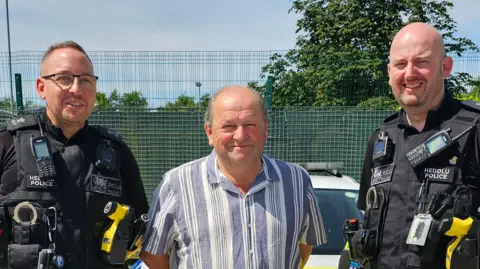Driver survives cardiac arrest on dual carriageway
A man who experienced a cardiac arrest while driving his van down a dual carriageway has been reunited with the police officers who helped to save him.
Neville Owen, 64, was travelling through the A55 Conwy Tunnel on 21 August 2023 when he became unresponsive.
CCTV footage shows how Mr Owen, from Llanfairpwll on Anglesey, lost control of his van which then started to bounce off the tunnel walls.
Police officers arrived at the scene within minutes where they carried out CPR and used a defibrillator, ultimately saving Mr Owen’s life.

 North Wales Police
North Wales Police
Mr Owen recalled how he had been experiencing chest pains a number of hours before the cardiac arrest, but thought nothing of it.
“That morning, I was having chest pains, thinking it was indigestion, so I took two tablets and went about my work,” he said.
Mr Owen stopped in Colwyn Bay to play bowls after finishing work, but began to feel unwell halfway through the game.
He decided to head home, but as he approached the tunnel he recalled feeling as if the traffic was slowing down.
“After that, I don’t remember anything,” he added.
Mr Owen was experiencing a cardiac arrest.
He became unresponsive and lost control of his white Transit van – which can be seen in CCTV footage bouncing off the walls of the tunnel before slowly coming to a stop – as other vehicles tried to avoid it.
Within minutes, two Traffic Wales police officers attended the scene and began CPR.
Roads crime officers PC Duncan Logan and PC Huw Capper then arrived shortly afterwards with an automated external defibrillator (AED) that saved Mr Owen’s life.
“We carry defibrillators as a routine on all the traffic cars, so when I arrived at the scene, I got it out straight away, went over, got the pads on and then and pressed the button on the machine and just let it do its business,” said PC Logan.
“It advised to take a shock, so everyone took a step back and fortunately, that worked.
“Within a few minutes, the ambulance service arrived,” he added.
‘Don’t be afraid to use a defibrillator’
Mr Owen said the next thing he remembered was waking up in hospital surrounded by his family.
“I saw my wife and the kids, and my brother were there. I said, ‘what’s going on?’
“It took a few minutes to get together and yes, I realised how lucky I was,” he said.
PC Logan recalled finishing his shift that night and feeling relieved by the outcome.
“I remember going home that evening and sitting down for a few minutes thinking, ‘he’s alive’,” said PC Logan.
“All I would say to people is, don’t be afraid to use a defibrillator.
“When you call 999, an ambulance call taker will tell you what to do. Start CPR, ask someone else to get the defibrillator, explain how to use the device and organise the ambulance service.
“A defibrillator can’t do anything to harm that person – it’s worth giving that person a chance.”
Mr Owen recently met PC Logan and PC Capper at their base in St Asaph for the first time since the incident.
“Words can’t describe really how I feel,” he told them.
Mr Owen added: “If you have any chest pains at all, don’t assume it’s indigestion – get it checked out.
“This pain was right in the middle of my chest, like a stinging pain around the heart – as you would get with indigestion.”
Following the incident, North Wales Police received an additional 30 defibrillators for its police stations and vehicles through a partnership with the Welsh charity Save a Life Cymru.
Every rural crime police car in the force now carries one of the potentially life-saving devices.
Dr Len Nokes, Chair of Save a Life Cymru, said: “A cardiac arrest can happen suddenly, to anyone, at any age, at any time, and by having mobile defibrillators ready and available in vehicles can be lifesaving for people in rural communities.”








